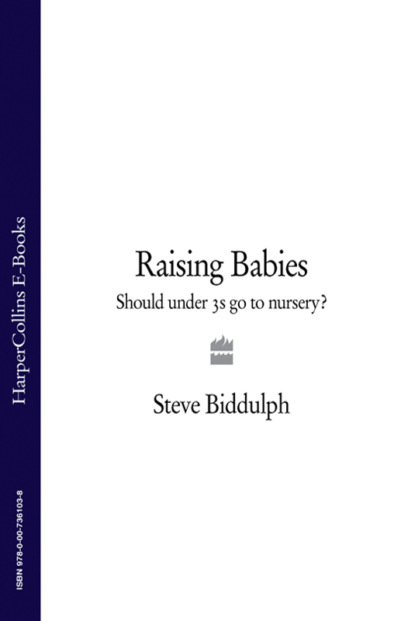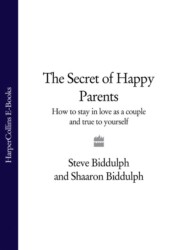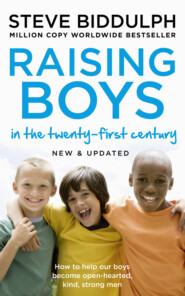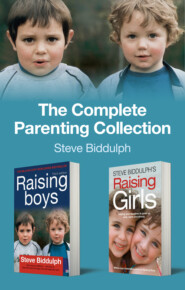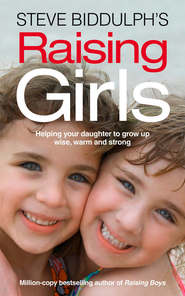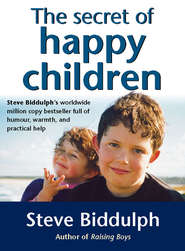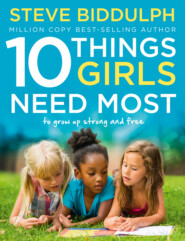По всем вопросам обращайтесь на: info@litportal.ru
(©) 2003-2024.
✖
Raising Babies: Should under 3s go to nursery?
Автор
Год написания книги
2019
Настройки чтения
Размер шрифта
Высота строк
Поля
6 Some staff are more caring than others
You will notice that the staff members differ in personal qualities. Some are energetic, warm people, that you would love your child to be friends with. Some seem rather young to be caring for children. Some of the older ones look tense, exhausted, doing their best to be available but basically worn out. Still others seem bored, doing the bare minimum of ‘work’. Of course, these things describe some parents too. But if this is your child, you have more reason and motivation to be at your best.
7 The staff care in a different way to a parent
The interactions with children – the way staff talk, hold them, respond to their emotions – is always affected by the fact that this is a professional relationship. There is a necessary coolness to everything. Eye contact is not the same. There is no time for long, peaceful, intimate moments. Concern has to be tempered, empathy withheld, because another ten or 20 children are there right now, ready to make their claim. In fact, staff would be in trouble – and we would be concerned – if they showed real affection and attachment to any particular child. What nursery staff offer is care, but it isn’t love, and the difference is vast.
8 There is a mechanical, institutional quality to the day’s events
Toileting, meals, nap time, nappy changing, face and hand washing, moving from activity to activity, are all mass activities. It’s a rare staff member who sings to a baby or blows a raspberry on its tummy while changing its nappy – something a mother or father does all the time. This is institutional life. (One nursery made a video of the children’s day, with a stationary camera, and then played it fast-forward at their annual parents’ meeting as a joke. There were one or two laughs at the start, then everyone went very quiet. It all looked so regimented, so impersonal.)
A place to call home
Remember your childhood days – if you were lucky, you will recall the haven of your bedroom or living room, a favourite chair or corner, well-loved toys and books. You might remember hours spent in a smallish back garden, which seemed to you quite big, and had interesting, even scary, corners and hidey-holes, insects and birds, some stuff to climb on. And over it all, with any luck, a feeling of peace, safety, time, your own space to be absorbed in fantasy play and imagining, which in turn was stimulated by books read to you, stories and TV programmes you were allowed to watch. You had friends who visited with their parents, or came in from next door, and you played with them, mostly in groups of two or three. You developed fantasy games, which lasted for hours, and from which you had to be dragged away for supper or bedtime. Perhaps you had these things, but even if not, you probably wished you had, and you want your children to have them too. Childhood needs its time, and its space.
9 The presence of babies seems wrong
The younger the child, the less appropriate the environment of nursery care seems to be for their needs. In terms of the enjoyment, opportunities, interactions, it will be clear as you watch that older children are better suited to nursery than the younger ones. Playing in groups, being able to fend for themselves or lose themselves in activities such as painting or sand-play – all seem to be happening for the three- and four-year-olds, while the babies and toddlers seem lost, disengaged, given a peremptory cuddle or a short-lived bit of focus from a carer. They manage to get through the day, but it is not exactly happy. Older children enjoy nursery, younger ones tolerate it.
10 A day is a really long time
The final thing to notice on this visit to the nursery is how slowly time passes. You don’t wonder at the high staff turnover, or the fact that many carers move on to more interesting or varied lines of work. But remember how time passes for a child. A day is a really long time when you are only two, even for a happy child. A day at home can be long too, but it is punctuated by being part of the parent’s life – going about, meeting friends, shopping – in a way that can be made enriching and interesting. There is more variety and change in a child’s world outside than inside the fences or walls of a daycare centre.
In the chapters that follow, you will find that each of these concerns, these ‘seat-of-the-pants’ observations, are shown by research to be factors that make a nursery a second-rate environment for children under three. You will also discover how hard it is to cater for this age range in a group setting, whereas for the over-threes it becomes the very thing that, in moderation, supplements what parents provide, and prepares children for school. The research picture supports what common sense might tell us, that distorting the natural social environment of children has disturbing results. However, you should trust your own impressions above all, as ultimately you have to decide for yourself if the research supports or denies your own common sense.
What nursery staff think of nurseries
The media loves telling horror stories of nurseries from hell, psycho-nannies or carers going off the rails, because these play to parents’ greatest fears. In this book, we are more concerned with the most typical and likely experiences – what you can expect to find, rather than the extreme failures. One way to form an overall picture is to listen to the views of people who work in nurseries, and who have been thinking about this topic all their working lives.
In 2004, the BBC screened a documentary called Nurseries Undercover. Parents around the country watched in dismay as hidden cameras showed children being mistreated by staff and the dismal conditions in some nurseries. There was a spate of letters to newspapers around the country, including this one from Fiona Steele, a nursery director in London:
(#litres_trial_promo)
‘I have worked in too many nurseries, for too many years, to be surprised by the neglect, incompetence and casual cruelty the programme revealed. But I did feel angry.
‘Everyone who talks about childcare, it seems, has a political agenda. But I am speaking purely from six years’ personal experience of working in nurseries. And I can tell you there is indeed a problem with the quality of childcare in this country – however uncomfortable the truth is, however much we might want to avoid anything that appears to curb our freedom to be child-free parents.
‘Parents send their children to nurseries for many different reasons: they might be single parents; they cannot afford not to work; they find parenting boring, or bonding difficult; they might have been persuaded that it will benefit their children’s social development (when did this fallacy become accepted wisdom?); or they simply don’t want to lose their place on the career ladder. Whatever the case, childcare is here to stay.
‘Many children have been in my care since they were three months old. Part-time places are not cost-effective, so many are with us from 8 am to 6 pm, five days a week, and so spend the majority of their waking time with me and my colleagues.
‘It is unthinkable that any child in our nursery would not receive immediate comfort and reassurance if they needed it (as was sadly the case in the documentary), but I am aware that many nurseries never engage emotionally with their children, maintaining a professional detachment. One nursery manager I know instructs her staff not to hug crying children because “it will make them soft”.
‘Nurseries have become big business. Large corporate structures are proliferating, with groups of nurseries being run from remote head offices where profit-driven, sales-oriented teams allow individual managers little say in the running of their nurseries.
‘One (ex-retail) director of such a chain revealed that his ambition was to create a strong “brand”, so that if you walked into any one, you would instantly know it was his. Everything would be the same: identical decor, identical staff uniforms, standard-issue toys. What has this to do with the care of children? It is not good practice, and yet it is awarded stars for excellence. Nursery owners, OFSTED inspectors and parents are obsessed with appearances, and the essence of good childcare is being lost.
‘It has been one of the saddest aspects of my career that not once – not at college or on any training course – has anyone ever mentioned the primary importance of emotional security and happiness in the development of a small child. Many staff (and parents) are insufficiently informed to understand that many demands we make of small children are unrealistic.’
Perhaps this is just one person’s minority view? It appears not – similar comments came from no less a person than Rosemary Murphy, the head of the National Day Nursery Association, which represents more than 3,000 private nurseries. Rosemary told the Guardian newspaper:
‘I am concerned that Britain is stumbling into changes about how small children are cared for without anything like the kind of informed public debate necessary. There’s a woeful lack of public debate. We need to look at this whole question very carefully for two reasons: firstly, because it is fundamental to get child development right, and secondly, because we need to think about what childcare should look like: are we developing the right kind of system?’
(#litres_trial_promo)
Coming from someone who represents the industry, these frank comments have to be a source of real concern.
In a nutshell
Visit a day nursery: your own senses will tell you that it is a difficult and less than ideal place for an under-three-year-old child. It lacks the kind of focus or empathy that is needed for a young child to feel loved, or grow and learn well.
A nursery director says that coldness and uncaring behaviour is widespread across Britain’s nurseries. The industry’s spokesperson herself is deeply concerned about where nurseries are going.
2 Slammers and sliders (#ulink_ab3b34ff-29e3-5a3b-9ad8-90e3d809625a)
Childhood today is nothing like it was for preceding generations, especially for very young children. In 1981, only 24 per cent of mothers returned to work before their baby was one year old. Today the figure is over 60 per cent. (Of course, 95 per cent of fathers return to work too.) As a result, almost a quarter of a million UK children under three attend a day nursery full- or part-time.
Worldwide, the number of babies and toddlers spending all day in nursery care has quadrupled in just ten years. Daycare was originally intended for three- and four-year-olds, but its use has spread downwards; sometimes babies are now put into nurseries and crèches when they are just days old. The hours have got longer too: millions of children under three are in daycare centres ten hours a day, five days a week in America, Australia, Brazil, Japan and other industrialized countries across the globe.
This large-scale group care of the very young is a recent thing. It has happened without prior research or understanding (compared with, for instance, the invention of kindergarten, which was specifically designed with child development needs in mind). If it turns out that early childcare is a damaging thing, then millions of lives will have been adversely affected. As we will see later, the chemistry of these children’s bodies and even the structure of their brains may well turn out to be different – but not in good ways.
Two kinds of nursery user
In the past it was hard to find accurate statistics about the extent of daycare. Statistics for children under three often did not specify how early it began, and for how many hours a week. Finally, in the late 1990s, some of the statistics were ‘disaggregated’ – that is, broken down to see if there are different types of choices hidden away in the ‘average’ figures. A remarkable discovery was made – there are two distinct patterns of nursery care usage that indicate two different sets of parenting beliefs and values.
(#litres_trial_promo) In private, childcare researchers have come to call these two groups ‘slammers’ and ‘sliders’.
Slammers are parents who ‘slam’ their child into nursery care as early in life as possible, and for as many hours a day as they are permitted. This can be from as early as 7 am until 6 pm or even later, usually for the full working week. These parents are essentially only with their babies at night-time and weekends. This group has begun to be studied extensively, and they have proven to be very consistent. Slammers usually place their babies in a nursery well before they are six months of age, and once there, tend to keep them there, full-time, until the child starts school. That means their children spend over 12,000 hours in a nursery before their fifth birthday. (This is more hours than they will spend in the schoolroom in the following 12 years – an astonishing amount of time.) While slammers might deny it, the choices they make essentially say: ‘This child does not come first in my life – it fits around my life. My career/income/social life/education are the defining factors of my time and energy.’ Slammers are only a small group – less than 5 per cent of parents. That is a small percentage, but it’s still a lot of children – approximately 100,000 out of the UK’s 2 million under-threes, and the number is growing, especially among urban professionals. It is a lifestyle that is often represented in magazines, and by corporate propaganda, as the ideal and desirable lifestyle, influencing others to see this as the norm.
Morning delivery
It is just after 7 am, and I am taking an early morning run in a town I am visiting for a few days. Turning down a leafy side street to get away from the noise and smell of traffic, I come across a rather posh nursery behind a big fence. A sign announces that it offers ‘early learning opportunities’ for children from birth to five. I pause for breath and study the sign, noticing the hours – 7 am to 7 pm each day. Suddenly I am startled by the sound of tyres skidding on gravel. A large four-wheel drive vehicle mounts the kerb just feet from where I am standing, so close that it makes me jump backwards. It comes to an abrupt stop, rocking on its springs. A frowning, smartly-dressed man leaps out, slams his door, strides around the car and pulls out a bundle from the back seat, from which I can just glimpse a tiny baby’s face peering out. The man barrels through the childproof gate and into the centre. In less than a minute he is out again and the car screeches away. The whole thing is like a cash drop at a bank. Maybe he is having a really bad day. I hope that’s what it is, and not just another morning. In either case though, I would hate to be that baby.
Sliders, by contrast, are parents who only place their children into nursery care gradually, and often much later – perhaps not until they are aged two or more – and usually for much shorter periods of time each week. This is closer to what child development theory would advise. (For more detail of what is appropriate by age and gender of child; see the Appendix at the end of this book.) Slider parents use nursery care cautiously, sometimes reluctantly, but balanced against a wish to get back some of the financial independence and self-esteem that goes with being in the paid workforce. They use nursery more when their child is over three and ready for some social and educational input. Sliders consider their children’s needs and attempt to find a family-friendly balance. Significantly, and thankfully, sliders are a much larger group – they outnumber slammers by about 8:1.
Of course, parents sometimes have to slide faster than they would wish. They are often forced to do so by economic pressures, as well as the loneliness that confronts mothers in commuter suburbs or apartment blocks where there is little other way of participating in the wider world. Since fathers are assumed to be going to work, the problems – and joys – of parenthood are largely left with the mother, though in a significant positive trend, increasing numbers of couples now reverse roles, or even take a year off work in rotation, so that their children can have a loving parent to care for them for at least the first two years of life. This non-sexist arrangement seems to work quite well, but again requires employer flexibility and some willingness by fathers to break old stereotypes.
The health consequences of distant parenting
Does it really matter if a child is close to its parents? We usually assume that close parent–child bonds are the fundamentals of a happy start to life. But why must this be so? Do we really need closeness to grow up well?
A unique and little-known American study was carried out into just this question, beginning with young adults in the 1950s and revisiting them 35 years later when they were in late middle age. Detailed interviews and medical assessments were carried out at the start of the study, including questions about how close they felt to their mother and their father.
(#litres_trial_promo)
When the subjects were tracked down 35 years later, their medical records were accessed and extensive assessments and interviews were carried out. What was discovered was quite astounding: 91 per cent of those who did not have a close relationship with their mothers (by their own assessment) had been diagnosed with a serious medical illness in mid-life – double the rate of those who reported a warm relationship. Closeness to fathers, or the lack of it, predicted similar differences in health. Worst off of all in health were those who had been close to neither mother or father.
The health conditions included heart disease, cancer, ulcers, alcoholism, hypertension and chronic asthma. As recent brain and immune system studies have revealed, love keeps you well. And the effects of love in childhood seem to keep on maintaining your health through life. Researcher Dr Norman Anderson, who reviewed these studies in 2003, was able to find over 20 similar studies, with 55,000 participants in total, all of which validated these findings. Being close to one’s parents does matter, and it matters long after you have grown up.





